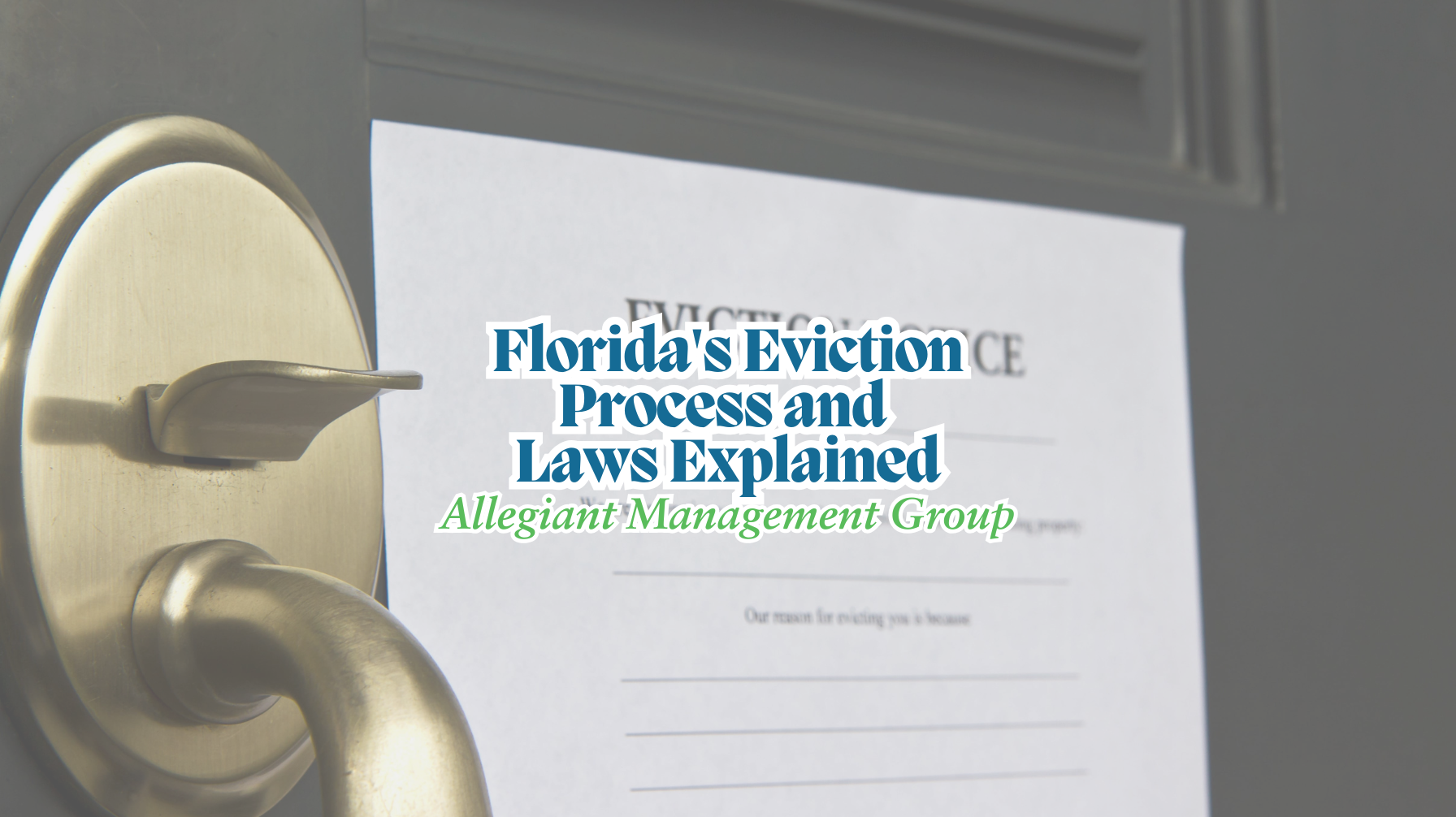Understanding Florida's Eviction Process and Eviction Laws
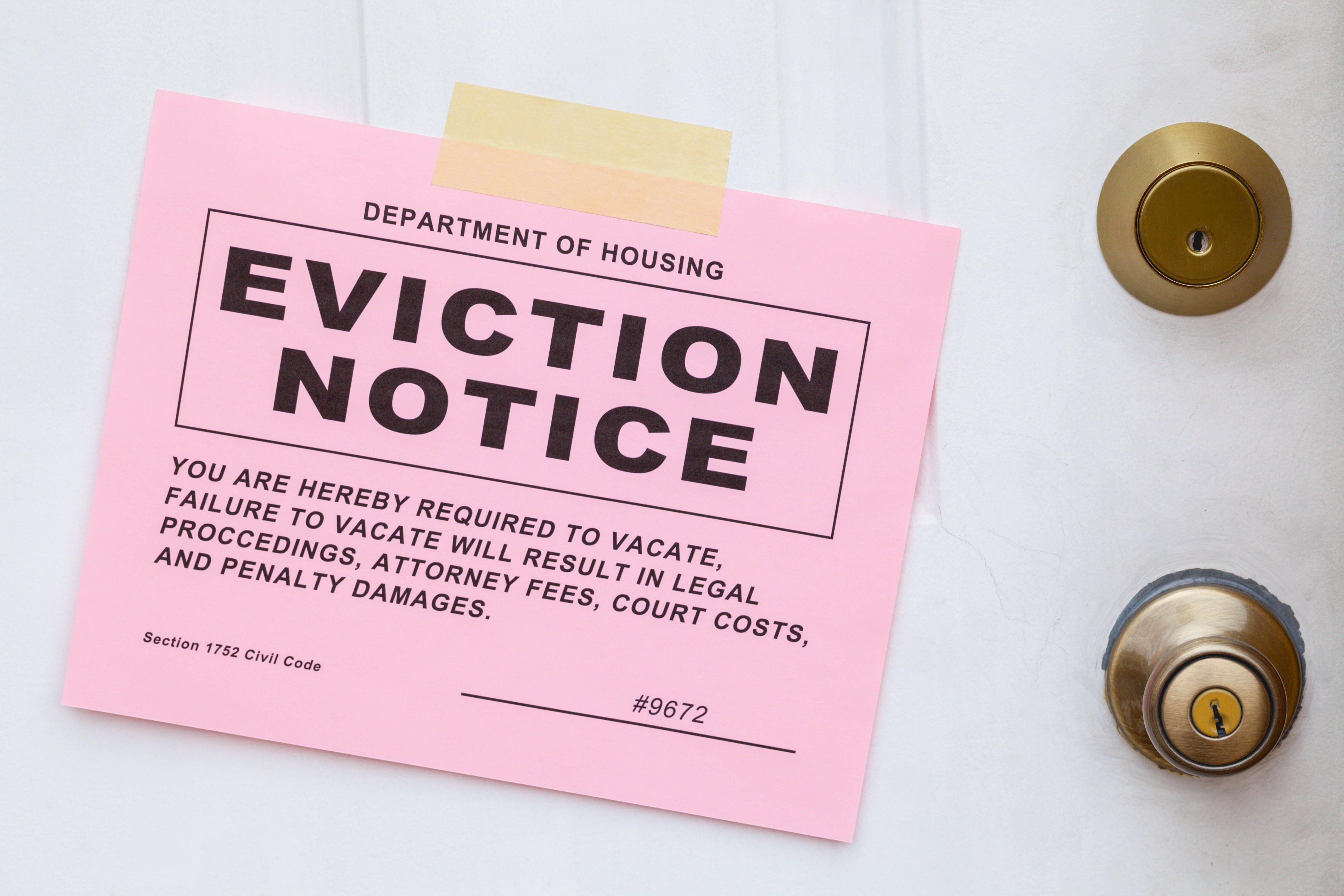
Understanding Florida’s eviction laws can be challenging but is vital for landlords and real estate agents.
These laws protect both sides. They explain how eviction notices work, court procedures, and the results of illegal actions. Evictions are different from unlawful detainers.
Chapter 83 of the Florida Statutes contains eviction state laws in Florida. These laws help resolve disputes between landlords and tenants.
Proper knowledge ensures compliance, avoids legal pitfalls, and prevents delays or financial losses.
Key Aspects of Florida’s Eviction Process
1. Legal Grounds: Landlords must have valid reasons, such as non-payment of rent or lease violations, to initiate an eviction.
2. Eviction Notices: The type of notice depends on the issue:
- 3-Day Notice: For unpaid rent, requiring tenants to pay within three business days.
- 7-Day Notice: For lease violations, giving tenants time to resolve the issue.
3. Court Filing: If the tenant does not follow the notice, landlords can file an eviction lawsuit with the right documents.
Legal Grounds, Proper Eviction Notice, and Court Filing are essential to the process.
Late Fees and Tenant Refusal to Vacate Rental Property
- Late Fees: These do not usually justify eviction but may be relevant if late payments persist.
- Refusal to Vacate: If a tenant does not leave after a court ruling, landlords can ask for a Writ of Possession. This helps them enforce the eviction legally.
Who This Guide Helps
- Property Owners: Struggling with difficult tenants and seeking clarity on eviction procedures.
- Real Estate Agents: Looking to provide better service by understanding Florida’s rental laws.
- Homeowners: Curious about the steps involved in evicting someone legally.
By learning the basics of Florida’s eviction laws, property owners and agents can handle these issues with confidence. This helps them follow the rules and protect their investments. Let’s unravel the process together!
Avoiding Self-Help Evictions in Florida

Landlords should avoid “Self Help” evictions. This includes changing locks, cutting off utilities, or taking a tenant’s things without a court order.
These actions are illegal in Florida and can lead to severe penalties, including fines and lawsuits.
Key Aspects of FL Eviction Laws
- Legal Grounds: Evictions require valid reasons, such as non-payment of rent or lease violations.
- Proper Notice: Serve eviction notices according to Florida law, detailing the issue and remedy period.
- Timelines: Adhere to strict legal timelines to avoid delays or dismissed cases.
- Court Filing: File an eviction lawsuit if the tenant doesn’t comply with the notice.
- Tenant Rights: Respect tenant defense rights, ensuring fair treatment throughout the process.
By following these steps and avoiding illegal eviction practices, landlords and property managers can understand Florida’s eviction laws. This helps them protect their interests.
Grounds for Evicting Florida Tenant
Landlords in Florida must base evictions on valid legal grounds.
Here are the most common reasons:
1. Non-Payment of Rent: If a tenant fails to pay rent on time, the landlord can start the eviction process.
2. Lease Violations: This includes unauthorized pets, illegal activities, or exceeding occupancy limits.
3. Holding Over: When a tenant does not vacate the premises when the lease ends without renewing, the landlord can evict them.
Understanding these legal grounds ensures landlords act within Florida laws and avoid potential claims of unlawful eviction. This differs from a squatter.
Eviction Notice Florida Process
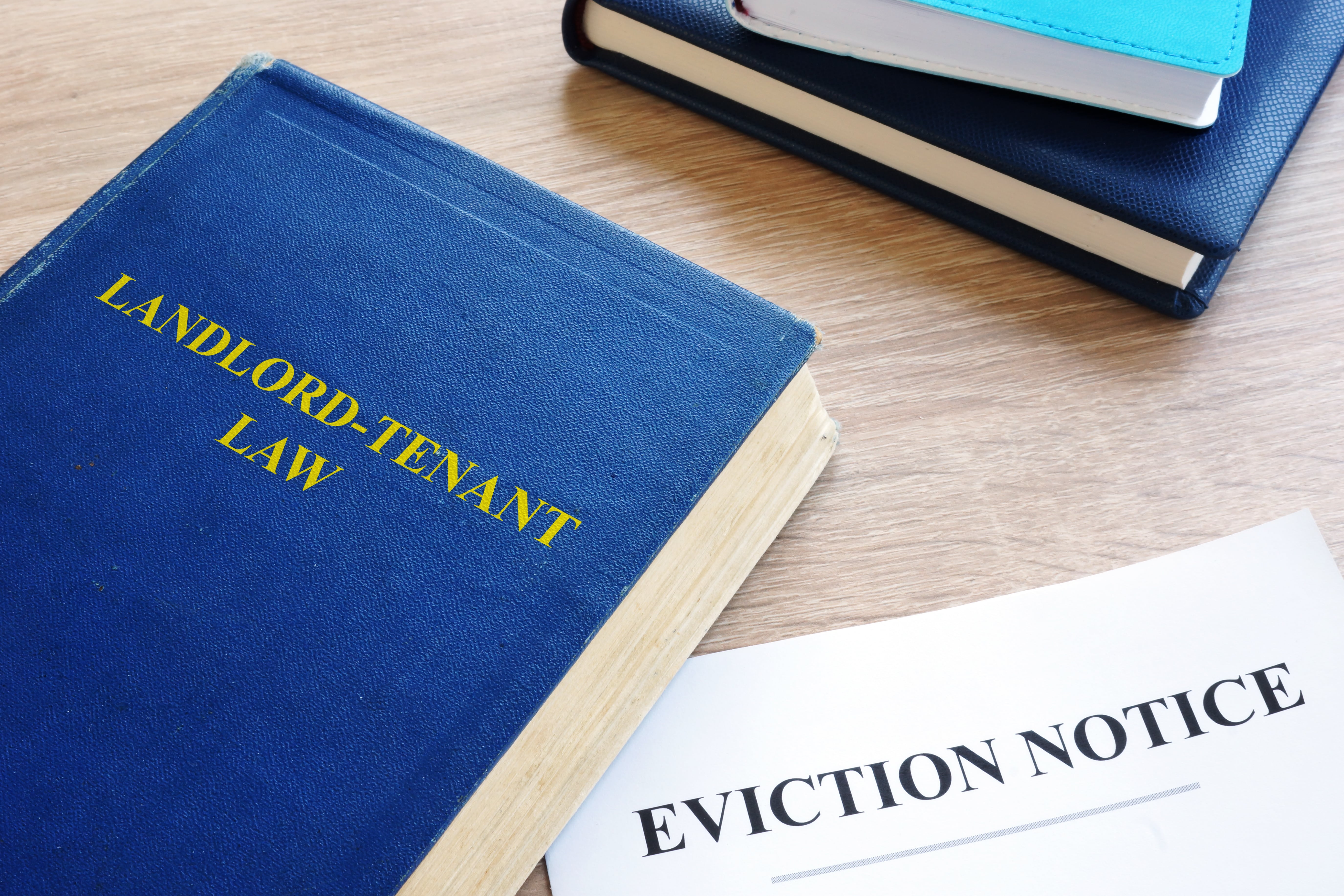
Eviction notices are a critical component of the FL eviction process. They are the first official step a landlord takes to legally evict a tenant.
These notices inform tenants of the problem and give them a chance to fix it, if possible. Landlords must ensure that these notices comply with Florida's statutory requirements.
Several types of eviction notices exist in Florida, each serving a specific purpose:
- 3-Day Notice: For non-payment of rent.
- 7-Day Notice: For lease violations, either curable or incurable.
- 15-Day Notice: To terminate a month-to-month tenancy.
- 30-Day Notice: Required for federally backed properties under the CARES Act.
The content and delivery of eviction notices are vital. Notices must clearly state the issue, specify the timeframe to resolve (if applicable), and deliver the information correctly.
You should give the notice in one of these ways: hand it to the tenant directly, post it on the property, or send it by mail. Each method has its nuances and impacts the eviction timeline.
Proper notice adherence can prevent unnecessary delays and legal complications. An area where precision and attention to detail are vital for property owners exists.
The Eviction Process in Florida: A Step-by-Step Guide
Navigating Florida’s eviction process requires following legal steps carefully to avoid delays or challenges.
Here’s a simplified breakdown:
1. Legal Grounds: Landlords need valid reasons to start the eviction process. These reasons can include non-payment of rent or lease violations.
2. Eviction Notice: Serve a properly formatted notice, giving tenants a chance to resolve any issues.
4. Waiting Period: Allow tenants the required time to comply. If they fail to comply, go to court.
5. File an Eviction Lawsuit: Submit legal papers and pay a fee to officially request possession of the property.
6. Court Hearing: Both sides present their case, and the judge decides.
7. Judgment of Possession: If granted, it states the tenant must vacate, though they may appeal.
8. Writ of Possession: If the tenant doesn’t leave, request this document so law enforcement can legally remove them.
Serving the Eviction Notice
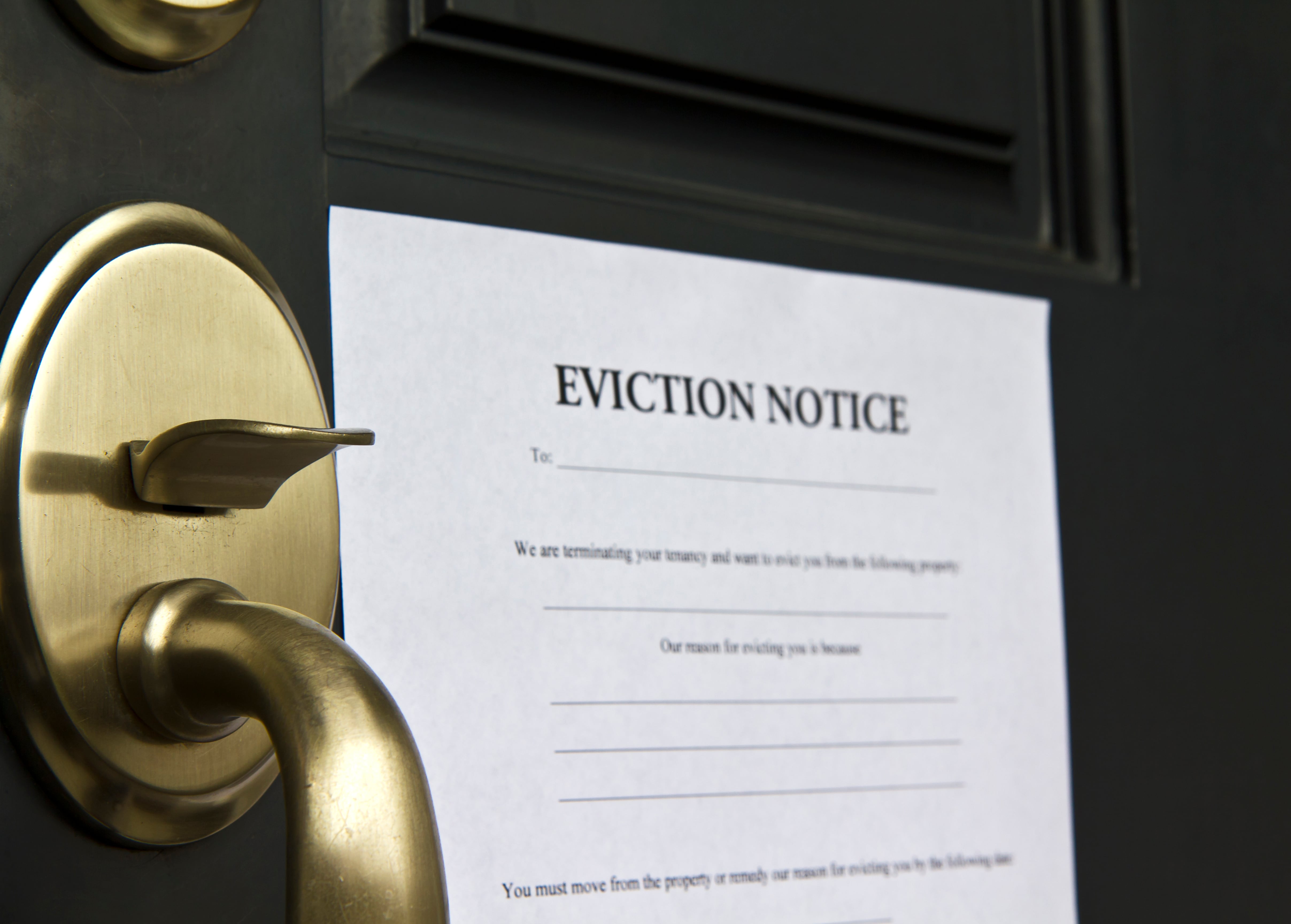
The eviction process in Florida starts with serving a legally compliant notice to the tenant. This step informs tenants of their violations and gives them a chance to remedy them.
1. Notice Types:
- 3-Day Notice: For non-payment of rent, tenants must pay overdue rent within three business days.
- 7-Day Notice: Tenants have seven days to resolve lease violations.
2. Notice Delivery:
- In Person: Hand the notice directly to the tenant.
- Posting: Attach it to the property if the tenant is not available to receive the notice.
- Mail: Send via certified mail, though this may affect the timeline.
Accuracy in serving the notice is critical to avoid legal issues and delays.
Filing the Eviction with the Court
If the tenant does not comply within the notice period, the next step is to file an eviction lawsuit. The plaintiff will file this lawsuit in the county court that has jurisdiction over the property.
1. Filing Requirements:
- Submit an eviction complaint detailing the claim.
- Submit the filing fee to advance the case.
- Provide all necessary documentation, such as the lease agreement and proof of notice delivery.
2. Tenant Response:
- The court issues a summons notifying the tenant of the lawsuit.
- Tenants have five days (excluding weekends and holidays) to respond.
3. Next Steps:
- If uncontested, the court may grant a default judgment in favor of the landlord.
- If disputed, the case moves to a court hearing.
Following these steps ensures compliance with Florida law and keeps the eviction process on track.
The Court Hearing and Judgment

During the eviction hearing, both landlord and tenant present their cases. The lawyer submits key evidence, such as lease agreements and payment records, for the judge to evaluate.
1. Preparation: Landlords should bring clear, well-organized evidence and arguments to strengthen their case.
2. Judgment of Possession: When the tenant has no real defense, the court usually gives this judgment. This allows the landlord to get back the property. Tenants may still appeal within a specified timeframe.
Issuance of the Writ of Possession
After a favorable judgment, landlords must obtain a Writ of Possession to enforce the eviction legally.
1. Requesting the Writ: Landlords apply through the court, typically paying a fee.
2. Sheriff’s Role: The writ allows the sheriff to carry out the eviction. You must post a notice 24 hours before the lockout.
3. Legal Removal: Landlords cannot remove tenants themselves—coordination with law enforcement ensures the process is lawful and orderly.
Knowing the hearing process and how to get a Writ of Possession helps landlords protect their rights. It also ensures they follow Florida laws.
Tenant Rights During Evictions

Florida tenants have specific rights during the eviction process to ensure fair treatment.
Here’s a quick overview:
1. Eviction Notice: Tenants must receive a proper notice explaining the reason and remedies before any court action.
2. Right to Challenge: Tenants can present evidence in court to dispute the eviction within 15 days.
3. Protection from Harassment: Landlords cannot harass tenants, shut off utilities, or change locks.
4. Utilities Access: Tenants have the right to ongoing utility access during proceedings.
5. Legal Representation: Tenants can seek legal help to defend their rights.
Legal Defenses Against Eviction
Tenants in Florida have several defenses against eviction that can strengthen their case or even stop the process.
Here are the key ones:
1. Procedural Errors: If a landlord does not follow the right legal steps, the court may dismiss the case. This can happen if they deliver the notice incorrectly or miss important deadlines.
2. Lease Violations: Tenants can argue the eviction violates the lease agreement. Providing proof of compliance strengthens this defense.
3. Property Conditions: Landlords who ignore property maintenance may face defenses. Tenants can withhold rent if there are housing code violations.
Unlawful Eviction Florida: The Consequences
Unlawful eviction in Florida can have serious consequences for landlords, including:
1. Lawsuits: Tenants can sue for damages like emotional distress and relocation costs, leading to expensive legal battles.
2. Fines: Courts may impose escalating penalties for illegal eviction practices.
3. Reputation Damage: Unlawful actions can harm a landlord’s reputation, discouraging potential tenants.
Special Considerations in Florida Eviction's
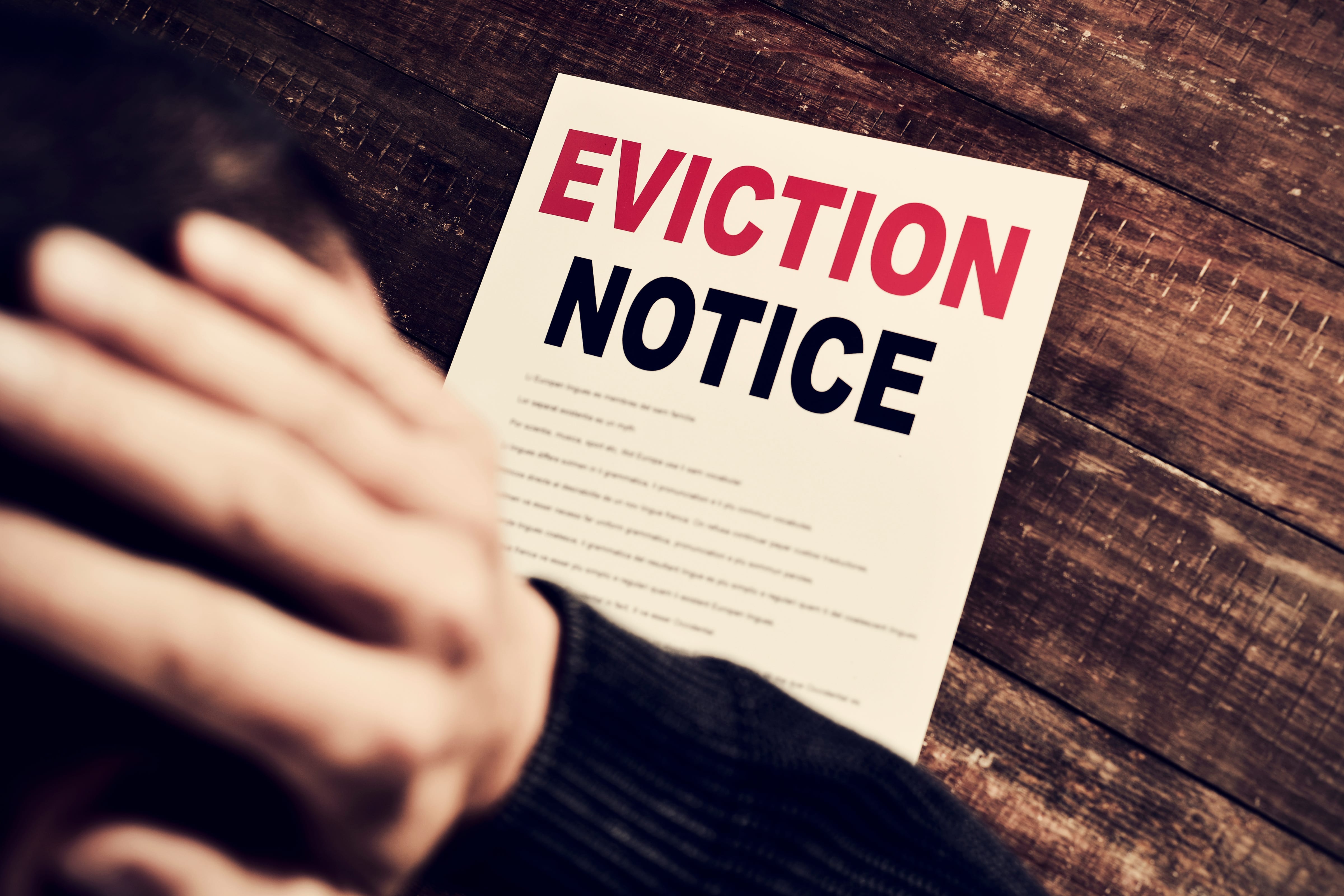
Florida’s eviction laws can be complex, especially in specific situations. Here’s what landlords and real estate agents should know:
1. Local Regulations: Some jurisdictions in Florida have unique eviction rules that must be followed.
2. Seasonal Protections: Certain areas may restrict evictions during severe weather events for tenant safety.
3. Special Cases:
- Disabilities: Tenants with disabilities may require reasonable accommodations.
- Military Protections: Service members have protection from eviction under federal laws.
- Rent-Controlled Properties: These have stricter eviction rules.
Understanding these factors ensures compliance, fair treatment of tenants, and effective navigation of complex situations.
Evicting a Tenant for Non-Payment of Rent and Late Fees
Non-payment of rent is a common reason for eviction in Florida.
Here’s how landlords can handle it:
1. Lease Terms: Clearly outline rent obligations and late fee policies in the lease to avoid disputes.
2. Three-Day Notice: Serve a proper three-day notice demanding payment. If unpaid, proceed with legal action.
3. Persistent Late Payments: While late fees alone don’t justify eviction, repeated late payments can. Properly documenting payment history strengthens the case.
Following these steps ensures compliance and minimizes legal challenges.
Lease Violations and Eviction
Lease violations, such as unauthorized pets or illegal activities, are common reasons for eviction. To enforce these, the lease must clearly outline prohibited actions.
1. Notice to Cure: Landlords issue this notice, giving tenants time to fix the issue.
2. Failure to Comply: If not resolved, eviction proceedings can begin.
3. Documentation: Evidence like photos, reports, or warnings strengthens the landlord’s case in court.
Evicting Non-Traditional Tenants
Removing non-traditional tenants, such as overstaying guests or occupants without leases, requires different steps:
1. Notice to Vacate: This sets a deadline for the individual to leave.
2. Legal Action: If they refuse, landlords may need to pursue further legal measures.
3. Seek Legal Advice: Consulting an expert ensures compliance with Florida law and avoids unlawful eviction claims.
Proper documentation and adherence to legal procedures protect landlords’ interests in both scenarios.
Avoiding Common Mistakes in the Eviction Process
Navigating Florida’s eviction process requires precision to avoid costly mistakes.
Common pitfalls include:
1. Missing Deadlines: Failing to meet legal timelines can lead to dismissed cases. Proper planning is essential.
2. Lack of Communication: Poor communication with tenants can escalate disputes or result in unlawful eviction claims. Open dialogue helps reduce risks.
3. Ignoring Tenant Rights: Violating tenant rights during the process can lead to legal penalties
4. Inadequate Notice: Not giving proper notice before legal action undermines the case.
5. Incomplete Paperwork: Skipping required documents can delay or invalidate eviction filings.
Proper Documentation and Legal Compliance
Accurate documentation is essential for a successful eviction. A clear lease agreement outlining rules and rent obligations sets the foundation.
1. Document Violations: Keep written notices, emails, and photos as evidence of lease violations.
2. Follow Procedures: Adhere to Florida’s legal eviction process to avoid delays or claims of unlawful eviction.
Consulting Legal Professionals
Evictions can be complex, especially for new landlords.
Hiring an attorney offers several benefits:
- Guidance: Ensure correct documentation, notices, and court filings.
- Representation: Legal professionals advocate for landlords in court and during disputes.
- Risk Reduction: Proper legal advice minimizes mistakes and strengthens eviction cases.
Staying Informed
Understanding Florida’s eviction laws is crucial. Clear communication, proper procedures, and professional advice are key to navigating evictions smoothly.
Using reliable resources and staying updated helps you follow the rules and protect landlord interests. For reference on how these processes can differ, take a look at how they do it in San Antonio, Texas.
At Allegiant Management Group, we simplify property management while protecting your investments.
If you have tough tenants, need help with Florida’s eviction laws, or want easy rental management, we can help!
Contact us today to partner with us for reliable, professional, and results-driven property management services. Your property, our priority!
Watch our Step-by-Step Guide to Florida Tenant Evictions Video.
Frequently Asked Questions (FAQs): Evictions in Florida
What are the legal grounds for eviction in Florida?
Florida landlords can evict tenants for nonpayment of rent, lease violations, property damage, illegal activity, or expiration of lease. They must provide proper notice: 3-day notice for nonpayment, 7-day notice for violations, or 15-day notice for termination of a month-to-month lease. Evictions require court approval.
What type of eviction notice is required?
Florida requires different eviction notices based on the reason:
- 3-Day Notice – For unpaid rent.
- 7-Day Notice – For lease violations.
- 15-Day Notice – For terminating month-to-month leases.
- 30-Day Notice - CARES Act Covered Property
Landlords must serve notices properly before filing for eviction.
Can a landlord evict a tenant without going to court?
No, Florida landlords cannot evict tenants without a court order. They must provide proper notice, file an eviction lawsuit, and obtain a judgment for possession. Self-help evictions, such as changing locks or shutting off utilities, are illegal and can result in penalties.
How long does the Florida eviction process take?
The Florida eviction process takes two to six weeks, depending on the case. Uncontested evictions may be resolved in about three weeks, while contested cases or delays in court can extend the process. Proper notice, court filings, and a writ of possession are required before removal.
What happens if a tenant refuses to leave after eviction?
If a tenant refuses to leave after eviction, the landlord can request a Writ of Possession from the court. The sheriff will serve the writ, giving the tenant 24 hours to vacate. If they still refuse, law enforcement can remove them.
Are self-help evictions legal in Florida?
No, self-help evictions are illegal in Florida. Landlords cannot change locks, shut off utilities, or remove tenant belongings without a court order. Violating this law can result in fines, tenant lawsuits, and financial damages. Legal evictions require a court-approved Writ of Possession.
Can tenants fight an eviction in Florida?
Yes, tenants can fight eviction in Florida by proving improper notice, landlord retaliation, discrimination, or unsafe living conditions. They must respond to the eviction lawsuit within five days and present evidence in court. If successful, the eviction may be delayed or dismissed.
What are the consequences of an unlawful eviction?
An unlawful eviction in Florida can result in tenant lawsuits, financial penalties, and court-ordered damages. Landlords may have to pay actual damages, attorney fees, and up to three months’ rent in statutory damages. Self-help evictions, like lockouts or utility shutoffs, are illegal and punishable by law.
Can you stop an eviction in Florida?
Yes, tenants can stop an eviction in Florida by paying overdue rent, negotiating with the landlord, proving improper notice, or presenting a legal defense in court. Filing a response within five days and showing evidence of retaliation, discrimination, or habitability issues may delay or dismiss the eviction.
Disclaimer: The information provided is for general information purposes only and is not legal advice. Please consult a qualified attorney for legal advice. This information does not create an attorney-client relationship.
Blog Updated: 03/10/2025


